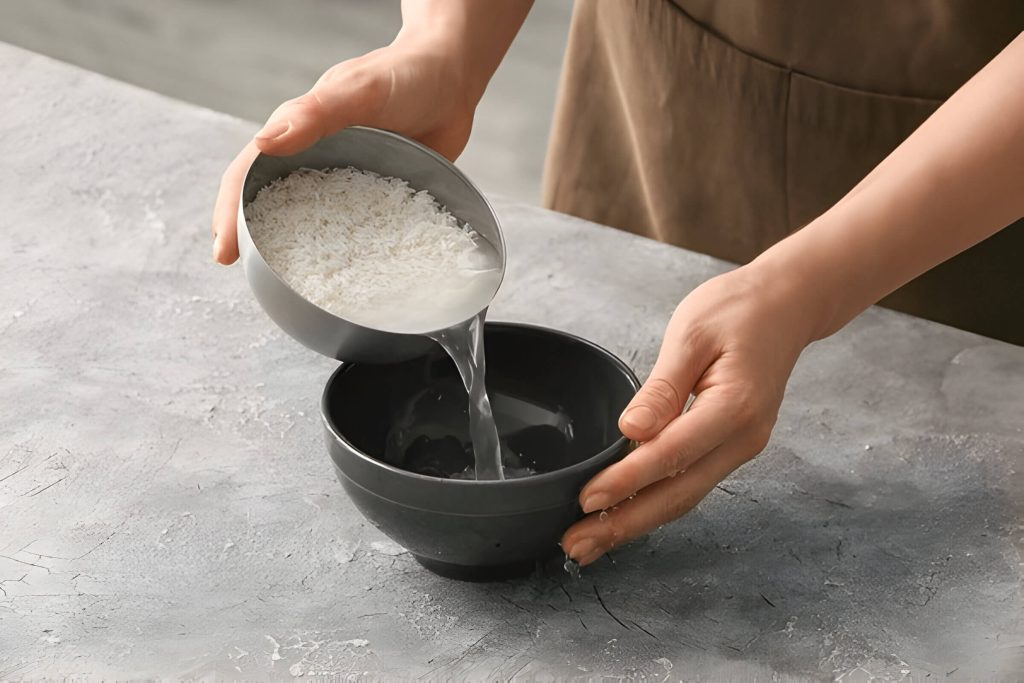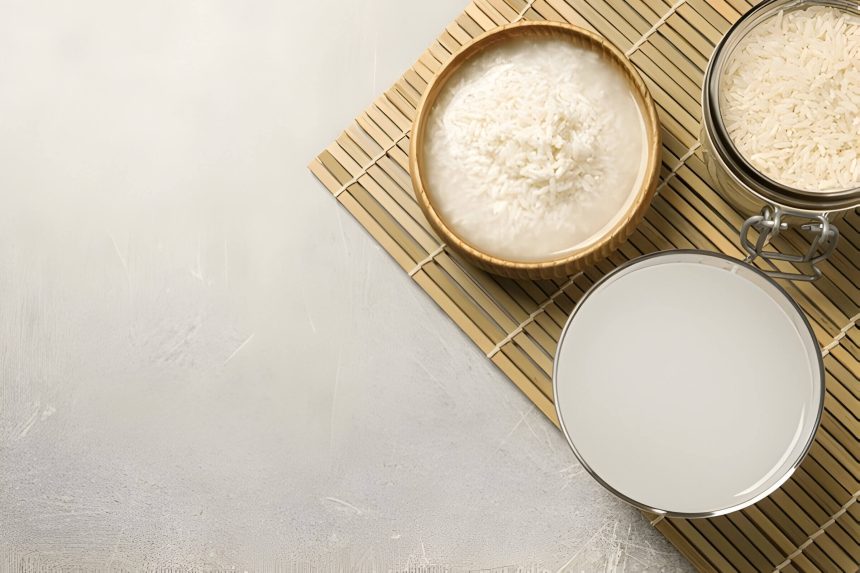The Rice Water Diet, an ancient Asian practice, has gained popularity as a health and beauty enhancer. This approach uses the starchy liquid from cooking rice as a dietary supplement. Originating in Japan and China, it’s believed to improve digestion and skin vitality. As interest in natural wellness grows, many are exploring this simple dietary addition for health benefits.
Understanding the Rice Water Diet
The Rice Water Diet, rooted in ancient Asian beauty traditions, has gained popularity in recent years for its potential health and cosmetic benefits. This practice involves consuming or applying rice water, which is the starchy liquid left over after cooking rice or soaking raw rice in water.
Historically, rice water has been used for centuries in countries like Japan, China, and Korea as part of skincare and hair care routines. The Yao women of China, known for their exceptionally long hair, have long attributed their hair health to rinsing with fermented rice water.
Rice water is rich in nutrients, including vitamins B and E, minerals, and amino acids. When fermented, it also contains pitera, a substance believed to promote cell regeneration. These nutrients are thought to provide various benefits when consumed or applied topically.
The principles of the Rice Water Diet typically involve:
- Drinking rice water as a beverage
- Using it as a face toner or hair rinse
- Incorporating it into skincare routines
While scientific research on the effectiveness of the Rice Water Diet is limited, many proponents claim improvements in skin texture, hair strength, and overall health. As with any dietary change, it’s important to consult with a healthcare professional before adopting this practice.
The Science Behind Rice Water (Nutritional Benefits and Composition)
Rice water, the starchy liquid left over after cooking rice, is more than just a culinary byproduct. It’s packed with a variety of nutrients that can benefit both internal health and external beauty. The composition of rice water includes essential amino acids, vitamins B and E, minerals like potassium and magnesium, and powerful antioxidants.
One of the most notable components in rice water is inositol, a carbohydrate that plays a crucial role in cell growth and metabolism. This compound is particularly beneficial for hair health, promoting strength and reducing breakage. Additionally, the presence of vitamins B and E contributes to overall skin and hair nourishment.
The amino acids found in rice water are building blocks for protein synthesis, supporting various bodily functions. Meanwhile, the minerals present, such as potassium and magnesium, are essential for maintaining proper hydration and electrolyte balance.
The antioxidants in rice water help combat oxidative stress, potentially offering protection against cellular damage. This makes rice water not just a topical treatment, but also a potential dietary supplement when consumed.
Understanding the science behind rice water’s nutritional profile helps explain its growing popularity in beauty and wellness circles, offering a natural and cost-effective solution for various health and cosmetic needs.
How to Prepare Rice Water for Consumption

Preparing rice water for consumption is a simple process that can be done using various methods. The soaking method involves rinsing rice thoroughly, then soaking it in water for 30 minutes to 2 hours. Strain the liquid and your rice water is ready. Alternatively, the boiling method requires cooking rice in excess water and collecting the starchy liquid after straining.
For those interested in a more potent version, the fermentation process can be employed. After preparing rice water using either method, leave it at room temperature for 12-24 hours before refrigerating. This enhances the nutrient content and creates a slightly tangy flavor.
When it comes to storage, keep rice water refrigerated in an airtight container. It typically lasts 5-7 days when refrigerated. For longer shelf life, you can freeze rice water in ice cube trays and thaw as needed.
Rice water can be consumed as is, or used as a base for smoothies, soups, or even as a natural sports drink. Experiment with different rice varieties to find your preferred flavor and nutritional profile.
Incorporating Rice Water into Your Diet (Dosage and Frequency)
Incorporating rice water into your diet can be a simple and effective way to boost your nutrient intake. When creating a rice water diet plan, it’s essential to consider the appropriate dosage and frequency. Generally, experts recommend consuming 1-2 cups of rice water per day, preferably on an empty stomach. The best time to drink rice water is often in the morning before breakfast or between meals.
For those interested in rice water fasting, it’s crucial to consult with a healthcare professional before embarking on any extended fasting regimen. Some practitioners suggest a 3-day rice water fast, where you consume only rice water and plain water. However, this should not be attempted without proper guidance and supervision.
When starting your daily intake, begin with smaller amounts and gradually increase to allow your body to adjust. Pay attention to how your body responds and adjust your consumption accordingly. Remember that while rice water can be beneficial, it should complement a balanced diet rather than replace essential nutrients from other food sources.
Potential Health Benefits of the Rice Water Diet
The rice water diet has gained attention for its potential health benefits, which extend beyond simple nutrition. One of the primary advantages is its positive impact on digestive health. The starch in rice water can help soothe the digestive tract, potentially alleviating symptoms of gastrointestinal discomfort and promoting regular bowel movements.
Many proponents of this diet claim it offers significant skin benefits. Rich in antioxidants and vitamins, rice water may help improve skin texture, reduce inflammation, and even combat signs of aging. Some users report a more radiant complexion after incorporating rice water into their skincare routines.
Interestingly, rice water has also been linked to hair growth. Its high content of inositol, a carbohydrate, may help strengthen hair follicles and promote overall hair health. Regular application of rice water to the scalp could potentially lead to thicker, shinier hair.
For those interested in weight management, the rice water diet may offer some advantages. It’s low in calories but can help create a feeling of fullness, potentially reducing overall calorie intake. However, it’s important to maintain a balanced diet and not rely solely on rice water for nutrition.
Lastly, some believe that the rice water diet aids in detoxification. While the body has its own natural detoxification processes, the vitamins and minerals in rice water may support these functions, potentially helping to flush out toxins more efficiently.
Possible Side Effects and Precautions of the Rice Water Diet
While the rice water diet has gained popularity for its potential health benefits, it’s crucial to be aware of possible side effects and take necessary precautions. Individuals with rice allergies should avoid this diet entirely, as it may trigger allergic reactions ranging from mild skin irritation to severe respiratory issues.
Prolonged adherence to the rice water diet may lead to nutrient deficiencies, as it lacks essential vitamins, minerals, and proteins found in a balanced diet. This could result in weakness, fatigue, and compromised immune function over time. It’s important to consult a healthcare professional before starting any restrictive diet.
Overconsumption of rice water can lead to bloating, nausea, and stomach discomfort due to its high starch content. Additionally, excessive intake may cause an imbalance in blood sugar levels, particularly in individuals with diabetes or insulin resistance.
To minimize risks, it’s advisable to use rice water as part of a varied diet rather than as a sole source of nutrition. Always listen to your body and discontinue use if you experience any adverse effects. Remember that while rice water may offer some benefits, it should not replace a well-rounded, nutritious eating plan.
Rice Water Diet vs Other Popular Diets
When comparing the rice water diet to other popular diets, it’s essential to consider both short-term effects and long-term sustainability. Unlike many fad diets that promise quick results, the rice water diet focuses on gentle detoxification and hydration. While detox diets often involve extreme calorie restriction or elimination of entire food groups, the rice water approach allows for a more balanced nutrition plan.
In contrast to crash diets that may lead to rapid weight loss followed by rebound weight gain, the rice water diet promotes a steady, sustainable approach to health. It encourages the consumption of whole grains, which provide essential nutrients and fiber, unlike some trendy diets that completely eliminate carbohydrates.
However, it’s important to note that like any restrictive eating plan, the rice water diet may not provide all the necessary nutrients for optimal health if followed exclusively for extended periods. A balanced nutrition approach, incorporating a variety of foods from all food groups, remains the gold standard for long-term health and weight management.
Combining the Rice Water Diet with Exercise and Skincare Routines
Incorporating a rice water beauty regimen into a comprehensive health and wellness plan can yield impressive results. By combining the nutrient-rich properties of rice water with a balanced workout plan and targeted skincare routines, individuals can take a holistic approach to their health and beauty goals.
Rice water, known for its high content of vitamins, minerals, and antioxidants, can be used both internally and externally. When consumed as part of a balanced diet, it may help boost metabolism and provide sustained energy for workouts. Topically, rice water can be applied to the skin and hair, potentially improving texture, reducing inflammation, and promoting a healthy glow.
To maximize the benefits of a rice water beauty regimen, consider integrating it with a consistent workout plan. Regular exercise not only improves overall health but also enhances circulation, which can contribute to healthier skin and hair. Combine cardio exercises with strength training to achieve optimal results and complement the nourishing effects of rice water.
Finally, develop a skincare routine that works in harmony with your rice water treatments. This may include gentle cleansing, exfoliation, and moisturizing steps tailored to your skin type. By addressing beauty concerns from multiple angles – nutrition, exercise, and targeted skincare – you can create a comprehensive approach to health and beauty that leverages the power of rice water alongside other effective practices.
Is the Rice Water Diet Right for You?
The rice water diet has gained attention for its potential weight loss benefits and nutritional value. However, it’s essential to approach this diet with caution and consider its pros and cons before incorporating it into your lifestyle.
While rice water is low in calories and may help with hydration, it lacks many essential nutrients found in a balanced diet. This could lead to nutritional deficiencies if followed for an extended period. Additionally, the diet’s effectiveness for long-term weight loss has not been scientifically proven.
Before starting any new diet, it’s crucial to consult with a healthcare professional or registered dietitian. They can assess your individual needs and help determine if the rice water diet is appropriate for you. Remember that sustainable weight loss and overall health are best achieved through a well-balanced diet, regular exercise, and lifestyle modifications tailored to your specific requirements.
The decision to try the rice water diet should be made after careful consideration of your health goals, current nutritional status, and overall well-being. As with any dietary change, moderation and informed choices are key to maintaining a healthy relationship with food and achieving your desired outcomes.
